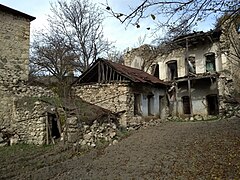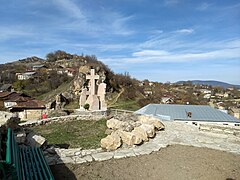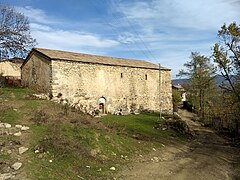Avetaranots, Nagorno-Karabakh
Avetaranots / Chanakhchi
Ավետարանոց / Çanaqçı | |
|---|---|
 | |
| Coordinates: 39°42′11″N 46°49′50″E / 39.70306°N 46.83056°E | |
| Country | |
| District | Khojaly |
| Population (2015)[1] | |
• Total | 1,121 |
| Time zone | UTC+4 (AZT) |
Avetaranots (Armenian: Ավետարանոց) or Chanakhchi (Armenian: Չանախչի; Azerbaijani: Çanaqçı) is a village in the Khojaly District of Azerbaijan, in the region of Nagorno-Karabakh. The village had an ethnic Armenian-majority population prior to the 2020 Nagorno-Karabakh war, and also had an Armenian majority in 1989.[2] Prior to 2020, the village was controlled by the Republic of Artsakh.
History
[edit]The village is the birthplace of Valerian Madatov (1782–1829), an Armenian melik (prince) in the Principality of Varanda, and later lieutenant general of the Russian Empire.
During the Soviet period, the village was a part of the Askeran District of the Nagorno-Karabakh Autonomous Oblast. The village was administrated by the breakaway Republic of Artsakh as part of its Askeran Province after the First Nagorno-Karabakh War. The village was captured by Azerbaijani forces on 9 November 2020, during the 2020 Nagorno-Karabakh war.[3]
Historical heritage sites
[edit]Historical heritage sites in and around the village include tombs from the 2nd–1st millennia BCE, a 12th/13th-century khachkar, the monastery of Kusanats Anapat (Armenian: Կուսանաց Անապատ) built in 1616, the church of Surb Astvatsatsin (Armenian: Սուրբ Աստվածածին, lit. 'Holy Mother of God') built in 1651, the 17th/18th-century Chanakhchi Fortress, and a 19th-century cemetery.[1]
Demographics
[edit]The village had 1,039 inhabitants in 2005,[4] and 1,121 inhabitants in 2015.[1]
Gallery
[edit]-
19th century Armenian carpet "Meghu"
-
19th century Armenian carpet "Trchnabun"
-
Old buildings
-
Fort
-
Armenian memorial
-
Kusanats Anapat Armenian Monastery
-
Kusanats Anapat Armenian Monastery
-
WWII Memorial
-
Surb Astvatsatsin Armenian Church of 1651
References
[edit]- ^ a b c Hakob Ghahramanyan. "Directory of socio-economic characteristics of NKR administrative-territorial units (2015)".
- ^ Андрей Зубов. "Андрей Зубов. Карабах: Мир и Война". drugoivzgliad.com.
- ^ "Daha 23 kənd işğaldan azad edildi".
- ^ "The Results of the 2005 Census of the Nagorno-Karabakh Republic" (PDF). National Statistic Service of the Republic of Artsakh. Archived from the original (PDF) on 2011-03-02. Retrieved 2013-01-09.










